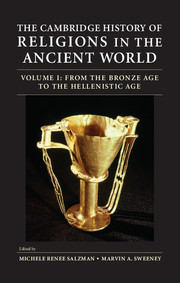Book contents
- Frontmatter
- Contents
- List of Figures and Maps
- List of Contributors
- List of Abbreviations
- Acknowledgments
- Introduction to Volumes I and II
- Introduction to Volume I
- Part I Mesopotamia and the Near East
- Part II Egypt and North Africa
- Part III Greece and the Eastern Mediterranean
- Part IV The Western Mediterranean and Europe
- Suggestions for Further Reading
- General Index
- Index of Citations
- Frontmatter
- Contents
- List of Figures and Maps
- List of Contributors
- List of Abbreviations
- Introduction to Volume II
- Part I Iran and the Near East
- Part II Egypt and North Africa
- 6 Traditional Religion in Ptolemaic and Roman Egypt
- 7 Judaism in Egypt
- 8 Ancient Egyptian Christianity
- 9 Cult and Belief in Punic and Roman Africa
- 10 Christianity in Roman Africa
- Part III Greece and Asia Minor
- Part IV Italy, Roman Gaul, and Spain
- Suggestions for Further Reading
- General Index
- Index of Citations
- References
7 - Judaism in Egypt
from Part II - Egypt and North Africa
Published online by Cambridge University Press: 05 October 2013
- Frontmatter
- Contents
- List of Figures and Maps
- List of Contributors
- List of Abbreviations
- Acknowledgments
- Introduction to Volumes I and II
- Introduction to Volume I
- Part I Mesopotamia and the Near East
- Part II Egypt and North Africa
- Part III Greece and the Eastern Mediterranean
- Part IV The Western Mediterranean and Europe
- Suggestions for Further Reading
- General Index
- Index of Citations
- Frontmatter
- Contents
- List of Figures and Maps
- List of Contributors
- List of Abbreviations
- Introduction to Volume II
- Part I Iran and the Near East
- Part II Egypt and North Africa
- 6 Traditional Religion in Ptolemaic and Roman Egypt
- 7 Judaism in Egypt
- 8 Ancient Egyptian Christianity
- 9 Cult and Belief in Punic and Roman Africa
- 10 Christianity in Roman Africa
- Part III Greece and Asia Minor
- Part IV Italy, Roman Gaul, and Spain
- Suggestions for Further Reading
- General Index
- Index of Citations
- References
Summary
The Egypt of the Bible, the Pharaohs, and the Persians
For the period of time from Abraham to Moses, we know the point at which ancient Israel took root in the Egyptian past. The Bible recounts a long sojourn of the Hebrews in Egypt, leading to the foundational events of Judaism: the Exodus, the giving of the Law, and the Mosaic covenant. For the historian, however, it is not an easy task to reconcile the biblical narrative with the historical and archaeological data now made available by Egyptology. The Bible and Egyptian hieroglyphs do not speak the same language. Points of intersection between the Egypt of the Bible and the Egypt of Egyptologists are both rare and a matter of dispute.
The Egypt of the Bible is a reasonably accurate reflection of the various features of society in the Egyptian New Kingdom. History and archaeology allow us to verify its account with a certain degree of probability. Thus, the travails of the Hebrews described in the book of Exodus correlate with the projects undertaken in the Delta by the pharaohs of the eighteenth dynasty. The strict supervision of the workers, against which Moses revolts, today finds confirmation in Egyptian documents originating from a village laborer of Deir el-Medina. This applies equally to quotas of bricks, the use of straw, and the allotment of vacation days. All of this was part of everyday life in Egypt of the thirteenth century BCE. In the ranks of the royal court, the figure of Aper-El, a Semite identified as vizier of Amenophis III, can be considered as a “prototype” of the biblical Joseph. His success demonstrates that foreigners, who had either moved to Egypt or who had been born into an immigrant community in Egypt, could rise to high-ranking positions, including high office in the Egyptian court.
- Type
- Chapter
- Information
- The Cambridge History of Religions in the Ancient World , pp. 189 - 210Publisher: Cambridge University PressPrint publication year: 2013



